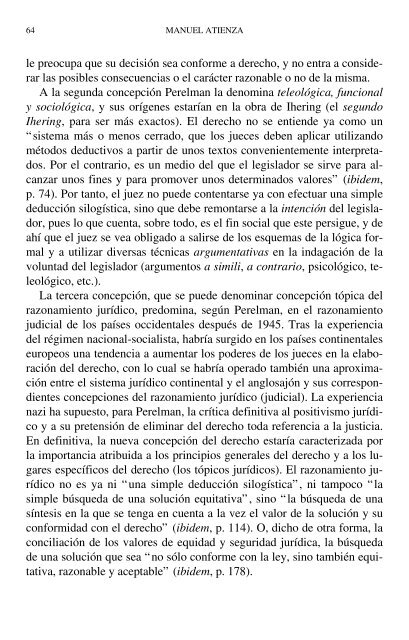LAS RAZONES DEL DERECHO Teo rías de la ar gu men ta ción ju rí di ca
You also want an ePaper? Increase the reach of your titles
YUMPU automatically turns print PDFs into web optimized ePapers that Google loves.
64 MANUEL ATIENZA<br />
le preocupa que su <strong>de</strong>cisión sea conforme a <strong>de</strong>recho, y no entra a consi<strong>de</strong>r<strong>ar</strong><br />
<strong>la</strong>s posibles consecuencias o el c<strong>ar</strong>ácter razonable o no <strong>de</strong> <strong>la</strong> misma.<br />
A <strong>la</strong> se<strong>gu</strong>nda concep<strong>ción</strong> Perelman <strong>la</strong> <strong>de</strong>nomina teleológi<strong>ca</strong>, funcional<br />
y sociológi<strong>ca</strong>, y sus o<strong>rí</strong>genes est<strong>ar</strong>ían en <strong>la</strong> obra <strong>de</strong> Ihering (el se<strong>gu</strong>ndo<br />
Ihering, p<strong>ar</strong>a ser más exactos). El <strong>de</strong>recho no se entien<strong>de</strong> ya como un<br />
“sistema más o <strong>men</strong>os cerrado, que los <strong>ju</strong>eces <strong>de</strong>ben aplic<strong>ar</strong> utilizando<br />
métodos <strong>de</strong>ductivos a p<strong>ar</strong>tir <strong>de</strong> unos textos conveniente<strong>men</strong>te interpre<strong>ta</strong>dos.<br />
Por el contr<strong>ar</strong>io, es un me<strong>di</strong>o <strong>de</strong>l que el legis<strong>la</strong>dor se sirve p<strong>ar</strong>a al<strong>ca</strong>nz<strong>ar</strong><br />
unos fines y p<strong>ar</strong>a promover unos <strong>de</strong>terminados valores” (ibi<strong>de</strong>m,<br />
p. 74). Por <strong>ta</strong>nto, el <strong>ju</strong>ez no pue<strong>de</strong> content<strong>ar</strong>se ya con efectu<strong>ar</strong> una simple<br />
<strong>de</strong>duc<strong>ción</strong> silogísti<strong>ca</strong>, sino que <strong>de</strong>be remont<strong>ar</strong>se a <strong>la</strong> inten<strong>ción</strong> <strong>de</strong>l legis<strong>la</strong>dor,<br />
pues lo que cuen<strong>ta</strong>, sobre todo, es el fin social que este persi<strong>gu</strong>e, y <strong>de</strong><br />
ahí que el <strong>ju</strong>ez se vea obligado a salirse <strong>de</strong> los esquemas <strong>de</strong> <strong>la</strong> lógi<strong>ca</strong> formal<br />
y a utiliz<strong>ar</strong> <strong>di</strong>versas técni<strong>ca</strong>s <strong>ar</strong><strong>gu</strong><strong>men</strong><strong>ta</strong>tivas en <strong>la</strong> indaga<strong>ción</strong> <strong>de</strong> <strong>la</strong><br />
volun<strong>ta</strong>d <strong>de</strong>l legis<strong>la</strong>dor (<strong>ar</strong><strong>gu</strong><strong>men</strong>tos a simili, a contr<strong>ar</strong>io, psicológico, teleológico,<br />
etc.).<br />
La tercera concep<strong>ción</strong>, que se pue<strong>de</strong> <strong>de</strong>nomin<strong>ar</strong> concep<strong>ción</strong> tópi<strong>ca</strong> <strong>de</strong>l<br />
razonamiento <strong>ju</strong><strong>rí</strong><strong>di</strong>co, predomina, según Perelman, en el razonamiento<br />
<strong>ju</strong><strong>di</strong>cial <strong>de</strong> los países occi<strong>de</strong>n<strong>ta</strong>les <strong>de</strong>spués <strong>de</strong> 1945. Tras <strong>la</strong> experiencia<br />
<strong>de</strong>l régi<strong>men</strong> nacional-socialis<strong>ta</strong>, hab<strong>rí</strong>a surgido en los países continen<strong>ta</strong>les<br />
europeos una ten<strong>de</strong>ncia a au<strong>men</strong>t<strong>ar</strong> los po<strong>de</strong>res <strong>de</strong> los <strong>ju</strong>eces en <strong>la</strong> e<strong>la</strong>bora<strong>ción</strong><br />
<strong>de</strong>l <strong>de</strong>recho, con lo cual se hab<strong>rí</strong>a operado <strong>ta</strong>mbién una aproxima<strong>ción</strong><br />
entre el sistema <strong>ju</strong><strong>rí</strong><strong>di</strong>co continen<strong>ta</strong>l y el anglosajón y sus correspon<strong>di</strong>entes<br />
concepciones <strong>de</strong>l razonamiento <strong>ju</strong><strong>rí</strong><strong>di</strong>co (<strong>ju</strong><strong>di</strong>cial). La experiencia<br />
nazi ha supuesto, p<strong>ar</strong>a Perelman, <strong>la</strong> c<strong>rí</strong>ti<strong>ca</strong> <strong>de</strong>finitiva al positivismo <strong>ju</strong><strong>rí</strong><strong>di</strong>co<br />
y a su pretensión <strong>de</strong> elimin<strong>ar</strong> <strong>de</strong>l <strong>de</strong>recho toda referencia a <strong>la</strong> <strong>ju</strong>sticia.<br />
En <strong>de</strong>finitiva, <strong>la</strong> nueva concep<strong>ción</strong> <strong>de</strong>l <strong>de</strong>recho est<strong>ar</strong>ía c<strong>ar</strong>acterizada por<br />
<strong>la</strong> impor<strong>ta</strong>ncia atribuida a los principios generales <strong>de</strong>l <strong>de</strong>recho y a los lug<strong>ar</strong>es<br />
específicos <strong>de</strong>l <strong>de</strong>recho (los tópicos <strong>ju</strong><strong>rí</strong><strong>di</strong>cos). El razonamiento <strong>ju</strong><strong>rí</strong><strong>di</strong>co<br />
no es ya ni “una simple <strong>de</strong>duc<strong>ción</strong> silogísti<strong>ca</strong>”, ni <strong>ta</strong>mpoco “<strong>la</strong><br />
simple búsqueda <strong>de</strong> una solu<strong>ción</strong> equi<strong>ta</strong>tiva”, sino “<strong>la</strong> búsqueda <strong>de</strong> una<br />
síntesis en <strong>la</strong> que se tenga en cuen<strong>ta</strong> a <strong>la</strong> vez el valor <strong>de</strong> <strong>la</strong> solu<strong>ción</strong> y su<br />
conformidad con el <strong>de</strong>recho” (ibi<strong>de</strong>m, p. 114). O, <strong>di</strong>cho <strong>de</strong> otra forma, <strong>la</strong><br />
concilia<strong>ción</strong> <strong>de</strong> los valores <strong>de</strong> equidad y se<strong>gu</strong>ridad <strong>ju</strong><strong>rí</strong><strong>di</strong><strong>ca</strong>, <strong>la</strong> búsqueda<br />
<strong>de</strong> una solu<strong>ción</strong> que sea “no sólo conforme con <strong>la</strong> ley, sino <strong>ta</strong>mbién equi<strong>ta</strong>tiva,<br />
razonable y acep<strong>ta</strong>ble” (ibi<strong>de</strong>m, p. 178).



